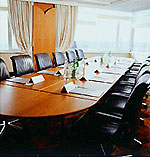Russia makes slow progress in improving economic freedom

(Business New Europe – bne.eu – January 17, 2014) Russia is making slow progress in improving economic freedom, according to the “2014 Index of Economic Freedom” report released January 15 by the conservative US think-tank, the Heritage Foundation.
Since reassuming the presidency in 2012, Russian President Vladimir Putin has launch long-delayed structural reforms to make Russia a more attractive place to invest for both international and domestic businesses. The country has already moved up in the World Bank’s “Doing Business” ranking from 120th place in 2011 to 92nd place in the 2014 survey.
Russia improved its score in the economic freedom ranking by 0.8 points, but this was not enough to improve its position in the global ranking and it fell one place from last year to 140th out of a total of 165 countries. That’s not a particularly good score, leaving it sandwiched between the basket cases of Tajikistan and Burundi. It also leaves Russia about 10 points below the global average and 16 points below the level of Western Europe.
Last year Putin was becoming visibly frustrated with the slow pace of change and is promising to crack heads together this year. Analysts have been saying Russia is at a crossroads (again) and if the reform effort fails, the country will be doomed to low growth that will likely inflame the popular protest movement.
“A number of emerging-market economies, including Russia, can speak of stagflation,” Ksenia Yudayeva, the Bank of Russia’s first deputy head, told an economic conference on January 15, the first time a senior Russian official has used the word “stagflation.”
However, Heritage Foundation analysts did note some improvements in four out of the ten economic freedoms that go into making up the index, including control of government spending, but reported declines in trade freedom, freedom from corruption and fiscal freedom. “Overall, notable improvements in trade freedom and monetary freedom have been largely offset by substantial declines in investment freedom, financial freedom, business freedom, and property rights, and Russia’s economy remains ‘mostly unfree,'” Heritage said.
Indeed, Russia remains stuck at the bottom of the ‘mostly unfree’ category and behind the other three BRIC nations, although the difference between Russia and Brazil, India and China is not great: all four BRICs have ‘mostly unfree’ economies.
Happily, a new sense of pragmatism has crept into the Kremlin’s rhetoric. During his state of the nation speech in December, Putin admitted for the first time that the horrible economic results in 2013 were due to “domestic factors”, taking the blame for the poor results that previously were put down to the global economic slowdown.
Russia has its work cut out if it is going to catch up with its former Soviet peers. Estonia remained near the top of Heritage’s list, ranked at 11th place (the same as its press freedom ranking that was also released this week by Reporters Without Borders). Lithuania, Czech Republic and Georgia accompany it in the “mostly free” category.
At the other end of the list Ukraine remains stuck in the “repressed” category together with Uzbekistan. Even the dictatorial regime in Tajikistan runs a more open economy than that of Ukrainian President Viktor Yanukovych at the moment. (And Tajikistan placed at 139 on the list just beats Russia as well.)
